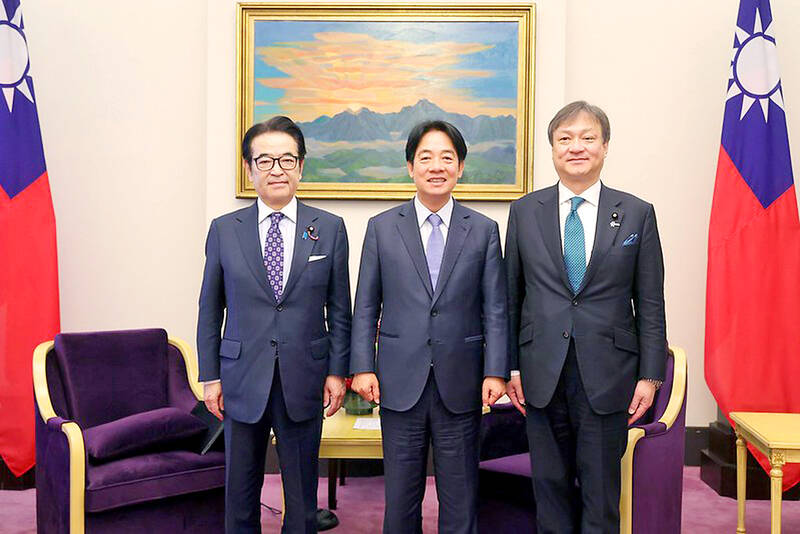Tokyo’s support for Taiwan Semiconductor Manufacturing Co’s (TSMC, 台積電) wafer fabs in Kumamoto Prefecture bears “tremendous significance” on future industrial partnerships between the two countries, Vice President and president-elect William Lai (賴清德) said yesterday.
Lai made the remarks during a meeting with Tsuneo Kitamura and Iwao Horii, two lawmakers in Japan’s House of Councilors, at the Presidential Office in Taipei.
With TSMC’s first fab scheduled to open on Saturday, Lai thanked the Japanese government and parliament for their support, which allowed the fab to be completed in one year and eight months.

Photo courtesy of the Presidential Office
Taiwan’s largest contract chipmaker earlier this month announced that it is building a second fab in the prefecture, Lai added.
“We believe these projects bear tremendous significance in terms of future industrial partnerships between the two countries and how we can jointly face the challenges and opportunities presented by the ‘smart era,’” he said.
Other Taiwanese semiconductor firms, such as United Microelectronics Corp (UMC, 聯電), Powerchip Semiconductor Manufacturing Corp (力積電) and ASE Technology Holding Co (日月光投控), are also investing in Japan, and should also find great support from Japanese officials and lawmakers, he said.
Kitamura and Horii have been paying attention to peace and stability across the Taiwan Strait, and, with their extensive experience, should contribute greatly to issues relating to defense, national security and diplomacy, he added.
Taiwan will continue to need the support of the two Japanese lawmakers to help maintain peace and stability in the region, he said.
“Taiwan on Jan. 13 accomplished a historic mission, with the people using their vote in the presidential election to decide the direction that the nation is heading. They decided to continue on the path to democracy and the world to make Taiwan stronger,” Lai said.
“I hope that Taiwan and Japan can build on their foundation and bolster ties through various types of partnerships,” he added.
Kitamura told Lai that former Japanese prime minister Shinzo Abe had promoted an Indo-Pacific strategy that values freedom and liberal democracy.
Taiwan and Japan need to work more closely together on security, economics, trade, tourism exchange and social welfare issues, with economic and trade relations between the two countries being the most important, Kitamura said.
“We hope that Vice President Lai, as an old friend of Japan, will continue to promote exchanges among the two nations’ lawmakers once you are sworn in as president. Under your leadership, the exchanges and partnerships between Japan and Taiwan will continue to develop and move forward through the work of the Taiwan-Japan Relations Association and the Japan-Taiwan Exchange Association,” Kitamura said.
Aside from thanking President Tsai Ing-wen (蔡英文) and Lai for conveying their condolences on the death of Abe’s mother, Kitamura also thanked them for expressing their sympathies to people affected by a series of earthquakes on the Noto Peninsula, as well as for the generous donations from Taiwanese.
The donations during such a difficult time again showed that Taiwan and Japan are true friends, he added.

A magnitude 7.0 earthquake struck off Yilan at 11:05pm yesterday, the Central Weather Administration (CWA) said. The epicenter was located at sea, about 32.3km east of Yilan County Hall, at a depth of 72.8km, CWA data showed There were no immediate reports of damage. The intensity of the quake, which gauges the actual effect of a seismic event, measured 4 in Yilan County area on Taiwan’s seven-tier intensity scale, the data showed. It measured 4 in other parts of eastern, northern and central Taiwan as well as Tainan, and 3 in Kaohsiung and Pingtung County, and 2 in Lienchiang and Penghu counties and 1

FOREIGN INTERFERENCE: Beijing would likely intensify public opinion warfare in next year’s local elections to prevent Lai from getting re-elected, the ‘Yomiuri Shimbun’ said Internal documents from a Chinese artificial intelligence (AI) company indicated that China has been using the technology to intervene in foreign elections, including propaganda targeting Taiwan’s local elections next year and presidential elections in 2028, a Japanese newspaper reported yesterday. The Institute of National Security of Vanderbilt University obtained nearly 400 pages of documents from GoLaxy, a company with ties to the Chinese government, and found evidence that it had apparently deployed sophisticated, AI-driven propaganda campaigns in Hong Kong and Taiwan to shape public opinion, the Yomiuri Shimbun reported. GoLaxy provides insights, situation analysis and public opinion-shaping technology by conducting network surveillance

Taiwan is gearing up to celebrate the New Year at events across the country, headlined by the annual countdown and Taipei 101 fireworks display at midnight. Many of the events are to be livesteamed online. See below for lineups and links: Taipei Taipei’s New Year’s Party 2026 is to begin at 7pm and run until 1am, with the theme “Sailing to the Future.” South Korean girl group KARA is headlining the concert at Taipei City Hall Plaza, with additional performances by Amber An (安心亞), Nick Chou (周湯豪), hip-hop trio Nine One One (玖壹壹), Bii (畢書盡), girl group Genblue (幻藍小熊) and more. The festivities are to

AFTERMATH: The Taipei City Government said it received 39 minor incident reports including gas leaks, water leaks and outages, and a damaged traffic signal A magnitude 7.0 earthquake struck off Taiwan’s northeastern coast late on Saturday, producing only two major aftershocks as of yesterday noon, the Central Weather Administration (CWA) said. The limited aftershocks contrast with last year’s major earthquake in Hualien County, as Saturday’s earthquake occurred at a greater depth in a subduction zone. Saturday’s earthquake struck at 11:05pm, with its hypocenter about 32.3km east of Yilan County Hall, at a depth of 72.8km. Shaking was felt in 17 administrative regions north of Tainan and in eastern Taiwan, reaching intensity level 4 on Taiwan’s seven-tier seismic scale, the CWA said. In Hualien, the